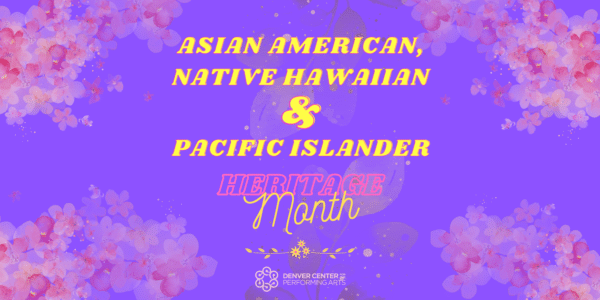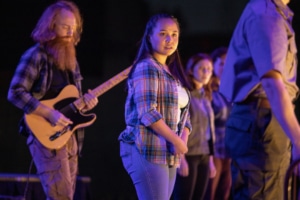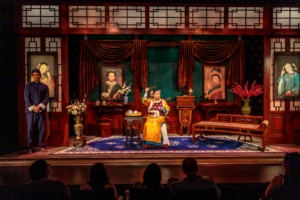DCPA NEWS CENTER
Enjoy the best stories and perspectives from the theatre world today.
Enjoy the best stories and perspectives from the theatre world today.

The month of May is Asian American, Native Hawaiian, and Pacific Islander Heritage Month! Originally a weeklong commemoration to mark the completion of the transcontinental railroad (the majority of which was laid by Chinese immigrants) and the first Japanese immigration to the United States. By the early 1990s, the month of May was officially designated Asian/Pacific American Heritage Month. In 2009, APA Heritage Month was renamed, Asian American & Pacific Islander Heritage Month. As of April 28, 2023, President Biden has officially proclaimed the month of May as Asian American, Native Hawaiian, and Pacific Islander Heritage Month.
Encompassing a plethora of different cultures, Asian Americans, Native Hawaiians, and Pacific Islanders have contributed immensely to American culture. Here at the Denver Center for the Performing Arts (DCPA), we are celebrating the spectacular AANHPI artists who have shared and continue to share their talents, hearts, and stories with us in Denver. We are so excited to have gotten the chance to interview these artists. Please welcome Leana Rae Concepcion (Rattlesnake Kate), Jasmine Forsberg (Wild Fire), and Seema Sueko (Vietgone, The Chinese Lady)!

Jasmine Forsberg
What makes AANHPI Heritage Month special is that the celebration varies from person to person. For Leana, it has more recently become a celebration. “To me, AANHPI Heritage Month finally feels like a celebration. I can’t go on social media without seeing someone posting something about it, celebrating themselves and their accomplishments, and seeing people who look like me making strides in whatever field they are in. It’s an amazing feeling to see people celebrating their culture and sharing their experiences.”
For Jasmine, it’s not just about celebration, but also about learning! “Asian American, Native Hawaiian, and Pacific Islander Heritage Month is a time to celebrate and learn about the wonderful culture and history of those we call our friends, family, and peers. The United States is often referred to as a cultural melting pot, but what good does it do if we don’t know the actual ingredients in this lovely stew? This month offers an opportunity to recognize all the contributions by members of your community.”

Seema Sueko
For Seema, this month is about celebration but also about getting to know the history of AANHPI Heritage Month and acknowledging the nationwide surge of violence and discrimination against the AANHPI community and how we can become the best allies that we can be. “Hate, jealousy, and evil fills the vacuum when we don’t know and don’t see one another. This month is just one way each of us can exercise our respective humanity, grow together, and continue to build just neighborhoods, just communities, and a just nation.”
AANHPI representation in the theatre industry is important. It fosters inclusivity and new storytelling as well as a positive support system for the AANHPI community. From David Henry Hwang (M. Butterfly, National Theatre) to Lloyd Suh (Great Wall Story, DCPA Theatre Company) to Lea Salonga (Miss Saigon, Broadway), these artists have cultivated a sense of community and paved the way for future generations of AANHPI artists. Representation is a domino effect. For both Leana and Jasmine, Lea Salonga was the on-stage representation of themselves that led both to pursue a career in the arts, and in turn, become someone else’s representation.

Leana Rae Concepcion
Leana told us that her earliest memory of seeing someone who looked like her on stage was Lea Salonga. She said, “My parents loved her and her voice is just to die for. She was, for a very long time, my only source of representation even before I knew the performing arts was something I was interested in.”
Jasmine echoed these sentiments. “Growing up, I attended countless Filipino parties hosted by family and friends. It wouldn’t be a true Filipino fiesta without the Magic Sing (at-home karaoke). My go-to song was ’My Heart Will Go On’ — wow, I was such a diva. All my titas and titos would say to me, ’You are like a young Lea Salonga!’ As a Filipina woman myself, Lea was a complete inspiration to me when I found my passion as a performer. To see a person who looked just like me claim her place as a leading lady, a Disney princess, and a pop icon was to see that it’s possible for my dreams to come true, too.” It bears repeating – representation matters!
Alongside the celebration, Asian American, Native Hawaiian, and Pacific Islander Heritage Month is also about acknowledging that our industry still has a long way to go in terms of inclusivity, acceptance, and representation. Seema shared an example of a time she faced profound discrimination in this industry. While working as the Associate Artistic Director at a theatre company, Seema learned that “the Board President expressed concerns to the Executive Director about me because I’m Muslim. ’Beware’ is what I was told he said to her. When I learned of this, I also learned that the Executive Director didn’t stand up for me, didn’t tell him his remarks were discriminatory. Later, when I was instrumental in bringing in a multi-year grant from the Wallace Foundation, this same Board President disparagingly said, ’Great, now we’ll have to do things we weren’t planning on doing.’ That thing they ’weren’t planning on doing’ was intentionally engaging the Asian American, Native Hawaiian, and Pacific Islander communities…as audience members.”

Jasmine Forsberg and the cast in DCPA Theatre Company’s Wild Fire. Photo by Adams VisCom.
Unfortunately, this is only one of many examples of how the AANHPI community and other oppressed communities have endured discrimination within the theatre industry.
So how can we as theatre professionals and theatre-goers be better allies for the AANHPI communities in this industry? Leana, Jasmine, and Seema offered great insight into how we can do this:
Leana: “We’ve got to retire this idea that [persons of color] are ‘taking’ roles away from people. The thing is, those roles were never yours to begin with so with that logic, we aren’t taking anything away… we’ve always been here. It’s just that now people are actually looking at us and giving us the opportunities that we were never afforded. And you’ve got to stop saying, ‘Oh you only got that because you’re Asian’ or ‘Well, I heard they were going ethnic for that role so it makes sense why I wasn’t seen.’ I promise you there is room for all of us in this industry.”

Leana Rae Concepcion as Annie Oakley in Rattlesnake Kate. Photo by AK Photography
Jasmine: “I am part of the most visible area of a company as an actor. What people see on stage every night is a mere fraction of the village it takes to put on a show. We need representation at every level of the playing field — from the crew, to designers, to management, to the creative team, and so on. I implore those in charge to actively work to diversify our spaces to create the safest work environment. The spaces in which we feel safe and seen are where the most beautiful art can be made.”
Seema: “When you hear people expressing discriminatory or racist thoughts, educate them; experience and support the work of AANHPI artists, and invite and welcome AANHPI audiences into your theaters.”

Sky Smith and Narea Kang in The Chinese Lady. Photo by Adams VisCom.
We here at the DCPA would like to take the time to thank the Asian American, Native Hawaiian, and Pacific Islander communities for their art, inspiration, and stories they’ve shared with the world because without them, “There would be no American Players Theatre, no East West Players, no M. Butterfly, no Disgraced, no Stop Kiss, no Vietgone, and on and on. How anemic our industry would be!” We’d like to thank Leana Rae Concepcion, Jasmine Forsberg, and Seema Sueko for sharing their talents and stories with us here at the Denver Center. Happy Asian American, Native Hawaiian, and Pacific Islander Heritage Month!
